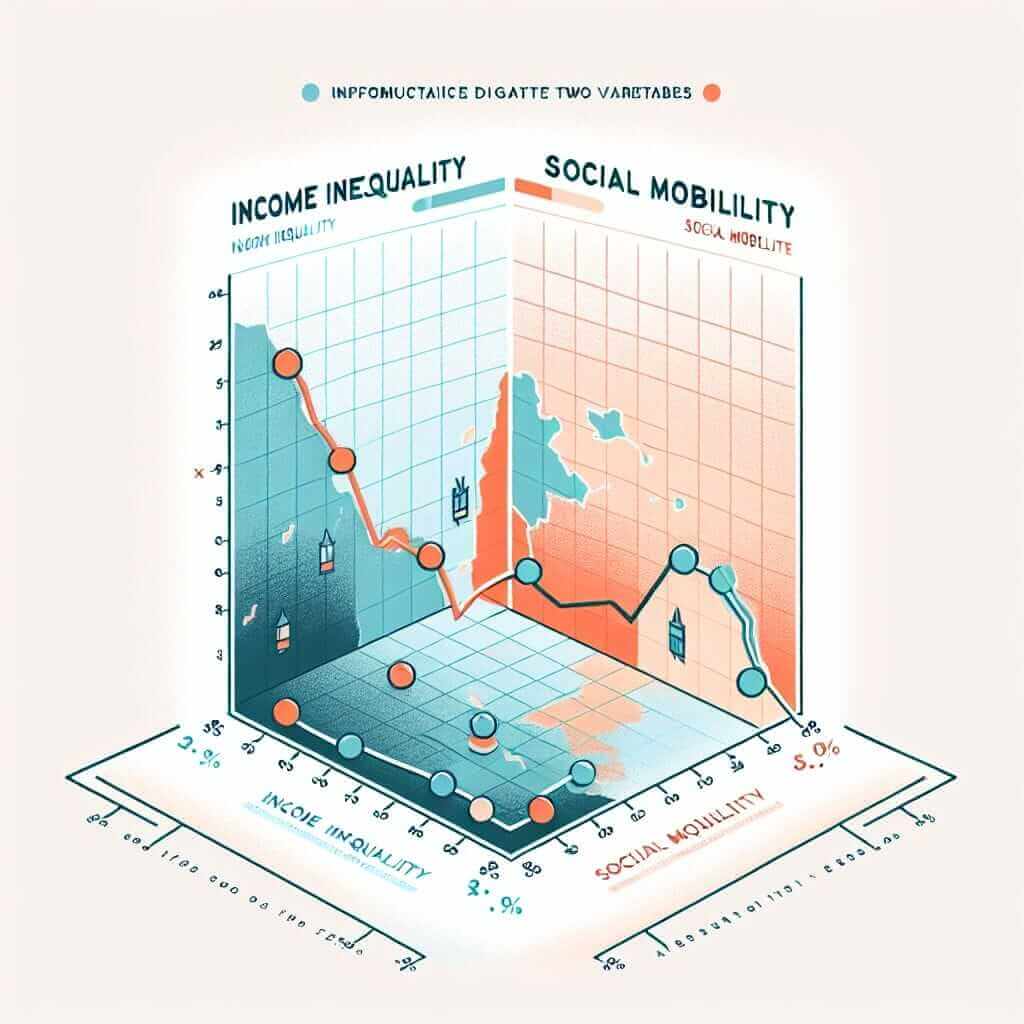“The effects of income inequality on social mobility” is a topic frequently explored in IELTS Writing Task 2, particularly within the realm of social and economic issues. This theme delves into the complex relationship between the distribution of wealth within a society and individuals’ ability to climb the socioeconomic ladder.
Below, we’ve crafted a few potential IELTS Writing Task 2 questions that mirror the structure and complexity of real exam questions:
- Some argue that income inequality is a natural consequence of a free market economy and should not be interfered with. Others believe governments should strive to reduce income inequality to promote social mobility. Discuss both views and give your own opinion.
- To what extent does income inequality impact an individual’s opportunities for social mobility? Provide specific examples to support your answer.
- Many believe that education is the key to overcoming the barriers presented by income inequality. However, others argue that systemic economic changes are necessary for true social mobility. Discuss both sides and give your own opinion.
Sample Essay: Question 1 Analysis & Response
Let’s break down the first question and develop a comprehensive response:
Question Analysis:
- Type: Opinion Essay (Discuss both views and give your own opinion)
- Keywords: income inequality, free market economy, social mobility
- Core Issues:
- The inherent tension between free market principles and social equity
- The role of government in mitigating income inequality
- The impact of both perspectives on social mobility
Model Essay:
Income inequality, a pervasive issue in many societies, sparks heated debate regarding its causes and consequences. While some advocate for the unfettered operation of free markets, accepting income disparities as an inevitable outcome, others contend that governmental intervention is essential to bridge the gap and foster social mobility. This essay will delve into both perspectives before presenting my own viewpoint.
Proponents of free markets argue that economic disparities are a natural consequence of individual talent, effort, and risk-taking. They posit that allowing market forces to operate freely incentivizes innovation and economic growth, ultimately benefiting all members of society. In this view, government intervention, such as wealth redistribution through taxation, stifles individual initiative and hinders overall economic prosperity. Consequently, they believe that social mobility is best achieved through individual merit and hard work within a free market system.
Conversely, those who advocate for government intervention emphasize the detrimental effects of unbridled income inequality on social mobility. They argue that individuals from disadvantaged backgrounds face significant obstacles in accessing quality education, healthcare, and social networks, perpetuating a cycle of poverty and limited opportunities. By implementing progressive taxation policies, social welfare programs, and investments in public services, governments can create a more level playing field, enabling individuals from all socioeconomic strata to realize their full potential.
In my opinion, while a degree of income inequality is inherent in a free market system, it’s crucial to strike a balance between economic freedom and social equity. Excessive income disparity can lead to social stratification, erode social cohesion, and hinder economic progress in the long run. Governments have a responsibility to mitigate the negative consequences of income inequality by implementing policies that promote equal opportunities, such as investing in early childhood education, affordable healthcare, and job training programs. Such measures can foster social mobility and create a more just and equitable society.
Word count: 298
Writing Tips:
- Structure: Clearly present both sides of the argument before providing your balanced opinion.
- Vocabulary: Utilize topic-specific vocabulary like “social stratification,” “economic disparity,” and “progressive taxation.”
- Examples: Provide relevant examples to support your arguments (e.g., specific government policies or their potential impacts).
- Grammar: Employ a variety of sentence structures and grammatical constructions to enhance clarity and sophistication.
Vocabulary Focus:
- Social Mobility (noun) /ˈsoʊʃəl moʊˈbɪləti/: The movement of individuals, families, or groups up or down the social ladder.
- Income Inequality (noun) /ˈɪnkʌm ˌɪnɪˈkwɒləti/: The unequal distribution of household or individual income across the various participants in an economy.
- Free Market Economy (noun) /ˌfriː ˈmɑːrkɪt ɪˈkɒnəmi/: An economic system based on supply and demand with little or no government control.
- Government Intervention (noun) /ˈɡʌvərmənt ˌɪntərˈvenʃən/: Actions taken by a government to influence the economy.
- Social Equity (noun) /ˈsoʊʃəl ˈɛkwɪti/: The fair and just distribution of resources, opportunities, and power in society.

Conclusion
Mastering the ability to articulate complex arguments surrounding social and economic issues like “the effects of income inequality on social mobility” is essential for achieving a high band score in the IELTS Writing Task 2. Consistent practice, coupled with a strong grasp of relevant vocabulary and essay structures, will undoubtedly enhance your writing proficiency. Explore related topics such as the influence of economic policies on social equity or the impact of economic inequality on social stability to broaden your understanding and essay writing capabilities.